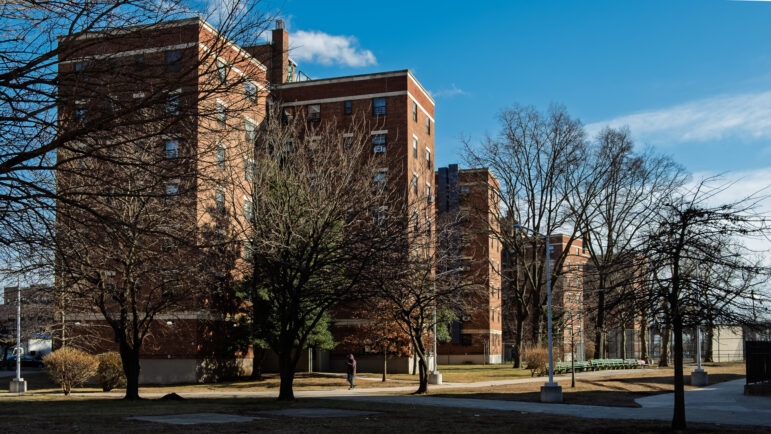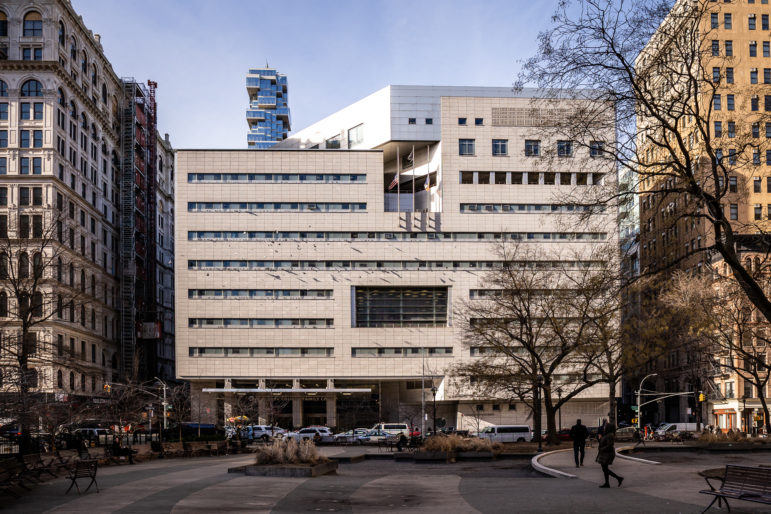Among Mayor Eric Adams’ promises for the year ahead: 900 new Safe Haven shelter beds, a plan to build 100,000 new units in Manhattan, and a program to connect unhoused expectant parents with homes.
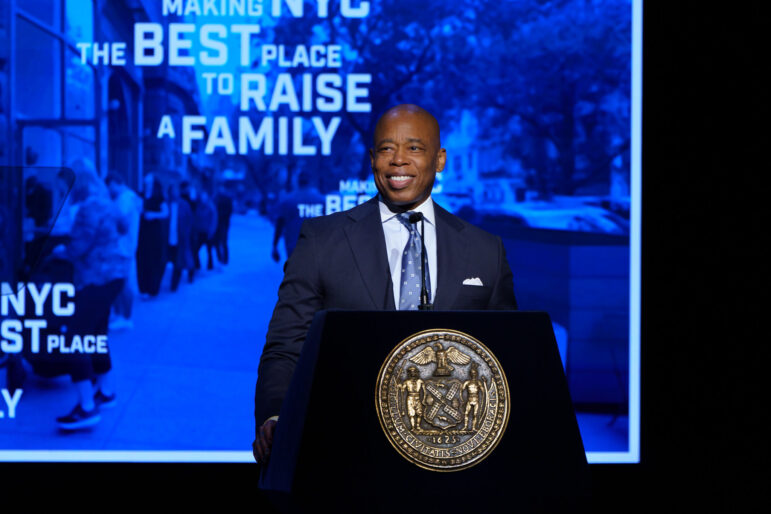
Benny Polatseck/Mayoral Photography Office
New York City Mayor Eric Adams delivers his fourth State of the City address at the Apollo Theater in Harlem on Thursday, January 9, 2025.Coming off a turbulent 2024 that saw him indicted on federal corruption charges, Mayor Eric Adams laid on his vision for the year ahead in his annual State of the City on Thursday, promising to make New York City “the best place to raise a family.”
In his fourth annual address to voters since taking office in 2022, Adams—who will run for re-election this year against a growing field of challengers—unveiled plans around affordability and public safety. He pledged to expand a set of youth initiatives, open new schoolyards and launch a free WiFi program for Section 8 households in Upper Manhattan and the Bronx.
A significant part of the mayor’s speech involved housing and homelessness, an effort to build off the momentum of his City of Yes zoning reforms passed by the City Council in December. Here’s a look at those plans, and what advocates and other lawmakers have said about them so far.
‘City of Yes for Families’
Last year, Adams championed his City of Yes for Housing Opportunity plan as a way to build “a little more housing” in every neighborhood. And while the revised version adopted by councilmembers last month scaled back some of mayor’s reforms, it’s still expected to spur an estimated 82,000 new homes over the next 15 years.
Adams’ latest initiative will build on that to target new housing for families, he said.
“We will work across our housing agencies to build more family-sized units and more homes for multi-generational families, so that parents and grandparents and grandchildren can stay together,” the mayor said. “We will work with the City Council to build more housing alongside schools, playgrounds, grocery stores and libraries.”
His proposal includes “The Manhattan Plan,” which aims to add 100,000 new homes in that borough alone over the next 10 years. Among them: 800 units of mixed income housing “co-located” alongside a new Bloomingdale New York Public Library branch in Manhattan Valley, and another 2,000 apartments at a city-owned site at 100 Gold St. in the financial district. The administration is also moving ahead with plans to rezone a swath of Midtown South.
“City of Yes for Families will also include new tools to support homeownership, help families make a downpayment on a home, add an additional dwelling unit to their property, and count rental payments towards credit history,” the mayor said.
In a statement, Rachel Fee of the New York Housing Conference called the family-focus “an obvious next step, which will go a long way toward mitigating outmigration,” of families from the city.
Still, others found the mayor’s proposal at odds with his prior actions, including battles over the budget the last two years in which Adams pursued cuts across most city agencies.
“Eric Adams spent his State of the City promising to make New York City a ‘City of Yes For Families,’ but in the last 3 years of his term, we’ve seen libraries defunded, 3-K and Pre-K providers facing months of delays in payments, and a deepening of the affordability,” Cleo Acevedo, an organizer with Citizen Action’s New York City, said in a statement following the mayor’s speech.
Others noted the exclusion of concrete plans around child care from Adams’ address. “If New York City is truly the best place to raise a family, that would come as a surprise to the thousands of families leaving due to the soaring cost of child care,” said Rebecca Bailin, executive director of New Yorkers United for Child Care.
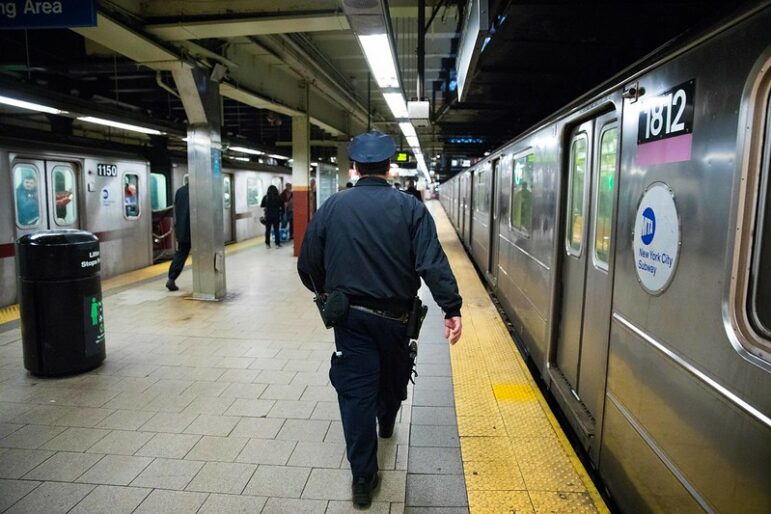
Benjamin Kanter/Mayoral Photo Office
A police officer patrols the subway.Subway policing and Safe Haven shelters
Another facet of the mayor’s speech was a pledged $650 million to address street homelessness. The Mayor’s Office of Management & Budget did not immediately respond to queries about how many years that funding would be spread out across, though the Department of Homeless Services said the funds would be in addition to the nearly $300 million a year the administration has base-lined for such efforts.
Investments will include the addition of 900 new Safe Haven beds, which offer fewer rules and barriers to entry than traditional homeless shelters, and plans for a new housing facility for “unsheltered New Yorkers with serious mental illness to give them the health care and specialized support they need,” the mayor said.
Adams also promised to add “hundreds of new police officers into our subway system” later this month—a tactic he’s turned to repeatedly since taking office, and despite an overall drop in crime in 2024.
He urged state lawmakers in Albany to pass the Supportive Intervention Act, which would expand the criteria for involuntary hospitalizations, something Gov. Kathy Hochul also said she is exploring in the wake of several recent and high-profile subway crimes, including the case of a woman who was fatally set on fire on the F train last month.
“We have seen the tragic consequences when severe mental illness on our streets and subways goes unchecked,” Adams said. “This crucial legislation will help us get those in need the care they deserve, provide assistance to those who can no longer care for themselves.”
But some advocates and progressive lawmakers criticized the mayor’s approach as punitive and more of the same. “He continues to push for further incarceration and criminalization of people living with serious mental illness, instead of closing the huge gaps in services that leave so many without care,” Hassen Bashir, a spokesperson with the group Communities United for Police Reform, said in a statement.
The City Council’s Progressive Caucus also decried the move to more policing, urging the mayor to instead take a “holistic” approach and to “deploy well-resourced, highly-visible, consistent mental health providers into our public spaces, equipped with the tools and training needed to help those in crisis.”
“Instead, Albany and City Hall continue to flood the subway with ineffective scanners, national guard troops stationed at entryways, and police officers unprepared for this challenging work,” the group said. “This harmful and expensive strategy has failed New Yorkers.”
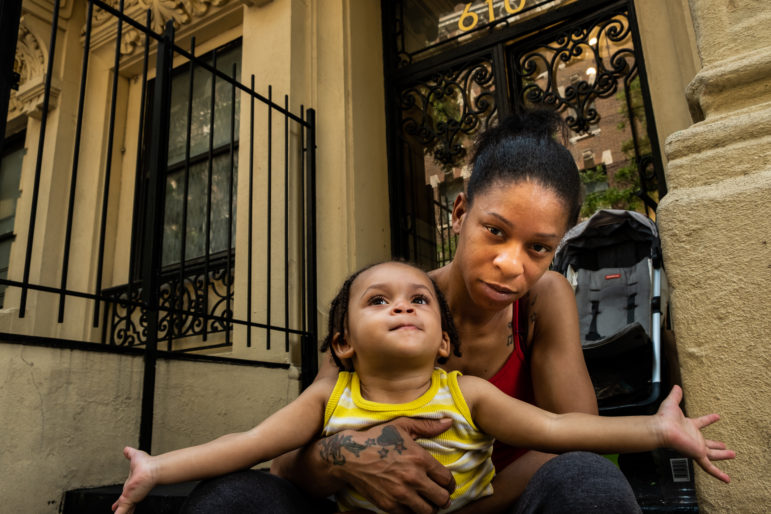
Adi Talwar
A mother and child outside a city homeless shelter site in 2021.Housing for new parents in shelter
Adams announced plans for a pilot program that will help connect expectant parents applying for shelter with resources to find permanent housing before their child is born.
“No child should ever be born in our shelter system,” the mayor said. “We must stop the cycle of poverty and housing instability before it ever begins and ensure mothers and babies do not go to a shelter after leaving the hospital.”
To reach the editor, contact Jeanmarie@citylimits.org
Want to republish this story? Find City Limits’ reprint policy here.





